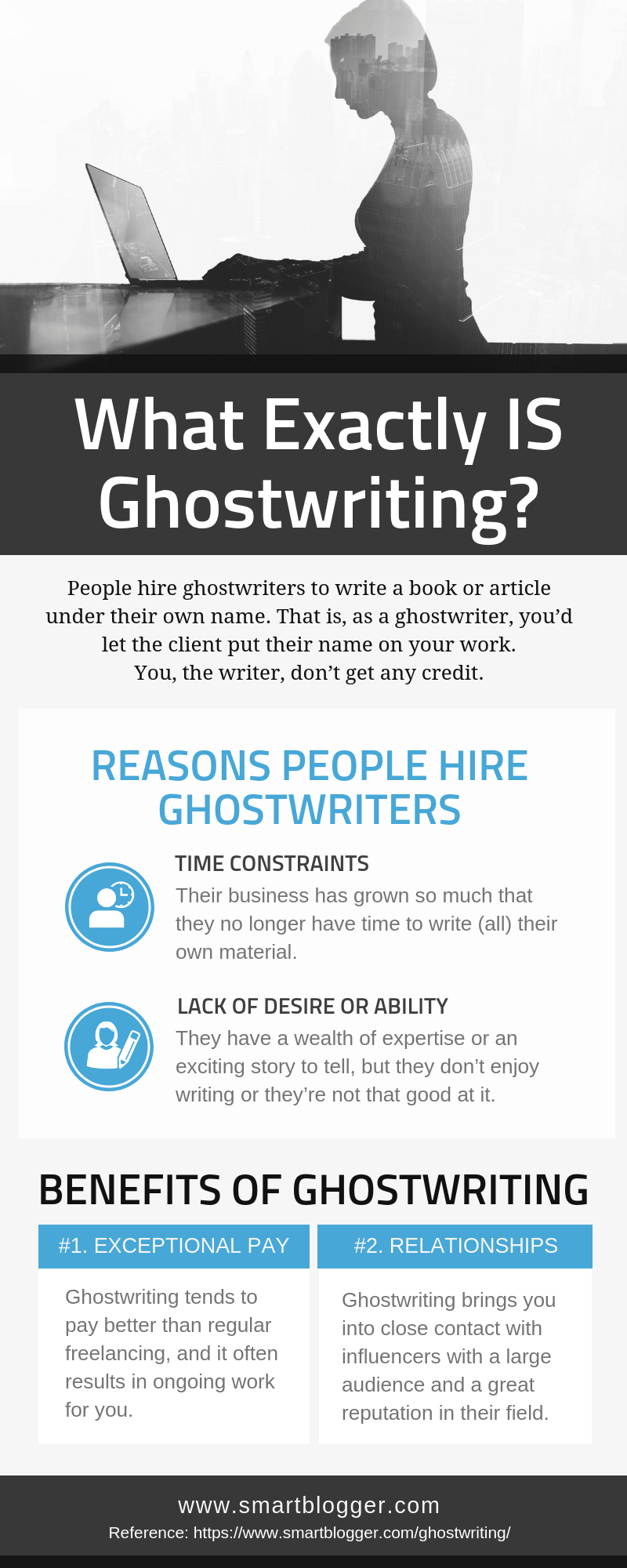You want to make money as a writer, right?
You’ve told everyone on Facebook (including your weird aunt) that you’re available to write. You’ve been writing guest post after guest post to showcase your talent and get your name out there. Maybe you’ve even landed a few freelance writing jobs already. (Good for you!)
But then a prospective client emails you with the question, “Do you offer ghostwriting services?”
And you’re stumped.
Maybe you’ve heard of ghostwriting. Maybe you have some idea what a ghostwriter is. Or maybe you wonder if it involves ouija boards in some way.
You don’t want to look like an idiot by emailing back to say, “Err… what do you mean?”
That sounds like a good way to send your potential client running for the hills.
But don’t worry — I’m about to tell you everything you need to know about ghostwriting, starting with…
What IS Ghostwriting?
You might already have some hazy ideas about ghostwriting. When I first heard of ghostwriting, I thought it was just used for celebrity memoirs.
It turns out memoirs are just the tip of the iceberg. Ghostwriting is everywhere — from independent authors using Amazon’s Kindle book publishing to popular bloggers using WordPress.
So what is it?
When you ghostwrite, you let someone else put their name on your work. That is, you don’t get any authorship credit — at all.
Typically, the person who commissions the work will own the copyright, which also means they can modify or republish the work in any way they see fit.
So why would someone hire a professional ghostwriter? Are they too lazy to write their own book or come up with original work or ideas?
Not necessarily. People hire ghostwriters for many different reasons, but the most common ones are:
- Their business has grown so much that they no longer have time to write (all) their own material.
- They have a wealth of expertise or an exciting story to tell, but they don’t enjoy the writing process or they’re not very good at it.
It’s nothing new, either: ghostwriting has been around, in one form or another, for centuries.
To give you a better idea of what being a ghostwriter may involve, my own ghostwriting has included:
- Taking a rough draft, editing it heavily, and expanding on it where necessary.
- Taking a blogger’s rough notes and transcribing them.
- Putting together short, functional blog posts (e.g., announcing a new writing podcast).
- Taking an assigned topic and very brief outline, then “ghost blogging” a post in the client’s voice and writing style.
- Writing a post based on a title and nothing more.
- Coming up with ideas, getting them approved, then ghostwriting the posts (though this is rare!).
As you can see, ghostwriting has a spectrum from something akin to an editing relationship to writing a piece from scratch.
And it’s growing in popularity.
The demand for high-quality ghostwriters is so high it’s now taught in schools — California State University, Long Beach offers a Ghostwriting Professional Designation Program led by Claudia Suzanne.
Of course, I’ve only ghostwritten for blogs.
Authors like Roz Morris and others have written whole books (nonfiction books, New York Times’ bestsellers, etc.) as ghostwriters, which is a far more involved process that includes extensive interviews with the ghostwriting client.
But Why Would You Let Someone Else Take Credit for YOUR Writing?
Assuming you want to build up your own brand as a professional writer, why would you want to be a ghostwriter?
After all, you won’t get any of the credit. Your name won’t appear anywhere on the piece, and you probably can’t tell anyone you wrote it.
So why do so many writers ghostwrite, and why do so many love it?
Well, because there are major benefits:
Benefit #1: Being a Good Ghostwriter Pays Exceptionally Well
One huge reason to get into the ghostwriting business is money. Ghostwriting tends to pay better than regular freelancing.
After all, having your name attached to your words is valuable for you as a writer. When you have a byline, you can use that piece of work to showcase your talent, build your reputation, and potentially attract new clients.
So it’s appropriate (and standard practice) to increase your hourly rate to compensate for the loss of these advantages.
There’s no exact rule of thumb for how much extra you should charge for a ghostwriting gig over regular freelance writing. Personally, I tend to increase my fee by about 15%–20%.
On top of that, once you’ve established a ghostwriting relationship with someone, it often results in ongoing work for you. Most people want their writing to be consistent, so it makes sense to stick with the same writer.
In other words, you have consistent work at a higher rate than usual. That’s quite a plus, isn’t it?
Benefit #2: Ghostwriting Lets You Develop Closer Relationships with Big Names in Your Field
As a ghostwriter, you’ll normally work quite closely with your client. You may be privy to their rough notes or mind maps, or you might interview them on the phone or in person.
Chances are, you’re also focusing your ghostwriting on a particular area of expertise (especially if you’re writing for a blog).
This means you’ve got a brilliant opportunity to get to know and be affiliated with someone well-established in your field.
You’ll find that you get valuable insights into the “behind the scenes” of a top blog, or you get a clearer idea of how a big-name book author works and thinks.
This may be eye-opening! It could give you some ideas for how best to move forward with your own business when you start your own blog.
And as you build up closer relationships, or even friendships, with your client, they might share your other work on social media, bringing you a lot of extra traffic. (Several of the people I ghostwrite for have supported me in that way.)
If you ever need a favor or need some advice, there’s a good chance they’ll be very happy to help.
So much of blogging success depends on getting a helping hand from other bloggers — particularly those with a large audience and a great reputation in their field.
Ghostwriting brings you into close contact with exactly those people.
The Counterpoint: Why You Might NOT Want to Be a Ghostwriter
There are a couple of big concerns that writers have about ghostwriting:
“But surely that’s not ethical?”
“But why should they benefit from my hard work?”
“But what about building my platform?”
These are real, valid concerns. And for you, they may be deal-breakers.
So let’s dig into them.
Objection #1: “When You’re a Ghostwriter, You’re Helping Someone Fool Their Readers — That’s Unethical”
When you’re a ghostwriter, the named author passes your words off as their own.
Which begs the question…
The authors who hire ghostwriters certainly think it is! But not all writers or readers agree. Many feel that some types of ghostwriting are more ethical than others.
For instance, think about these two scenarios, which are on opposite ends of the ghostwriting spectrum:
- A big-name blogger hires a freelance ghostwriter to write an e-book on their behalf. The blogger talks to the ghostwriter for an hour and provides a detailed outline. Once the e-book is complete, the big-name blogger reads it, edits it, and puts his or her name on it.
- A big-name blogger hires a ghostwriter to write an e-book on their behalf. They give the ghostwriter free rein to come up with the topic and outline, and they don’t supply any help. When it’s done, the blogger puts his or her name on it without giving it a second look.
Personally, as a reader, I’d feel comfortable with situation #1. The thoughts in the e-book belong to the blogger, but the ghostwriter has helped shape them.
Situation #2, however, seems a lot thornier. As a reader, I’d feel cheated by that.
I’m buying the e-book because I want the blogger’s expertise — not that of a ghostwriter I don’t know.
If you’re thinking of ghostwriting, you have to make up your own mind about what is — and isn’t — ethical. Where would you personally draw the line as a ghostwriter, if at all?
If you want a deeper dive into ghostwriting ethics, check out Patty Podnar’s post Is Ghostwriting Ethical?
Also, Amanda Montell’s Your Favorite Influencers Aren’t Writing Their Own Content—These Women Are is quite eye-opening about some of the less ethical practices in the ghostwriting world.
Objection #2: “It’s Too Painful Watching Someone Else Get Praised for YOUR Work”
It may sound silly, but not getting recognition for your writing can be quite painful — unbearable to some.
I have to admit that, as a writer, it can sometimes sting a little to see a blogger receive lots of lovely praise for a post that I wrote every word of. And I’m not alone; many talented writers find themselves missing the attention and craving the recognition.
It’s no fun watching someone bask in glory that should be yours.
But think of it this way: All that praise is a sign you did a great job. You can be proud of that, and you can feel confident you’ll get hired again!
Also, as experienced ghostwriter Roz Morris points out in an interview with whitefox, it’s not just ghostwriters who go unnoticed by readers:
So, if you can’t stand watching someone else take the praise, that’s okay. Many writers feel that way. But maybe we should also keep things in perspective.
Objection #3: “Ghostwriting Keeps You from Building Your Platform”
Even if you’re okay with someone else getting the praise, you may still oppose the idea of letting them take credit.
Some writers feel that, to become a successful freelance writer, you need to take credit for every powerful word you write and create an impressive body of work with your name on it. They believe that ghostwriting is essentially a waste of time.
After all, when you’ve got a bio (or at least your name) on every blog post you write, each of those posts helps raise your profile. You’ll be bringing in new readers and potentially new clients through your work — without any additional marketing.
This is essentially the argument that Demian Farnworth puts forward in The Brutally Honest Truth About Ghostwriting:
I certainly think it’s worth putting some serious thought into how best to make ghostwriting work for you. It might be that you want to solely focus on your own platform (heck, you might even hire ghostwriters of your own, someday down the line!).
But there’s no shame in taking a ghostwriting job to generate a steady income while you build your platform. It doesn’t have to be one or the other. You can do both at the same time.
Ghostwriting takes some focus away, but that doesn’t mean it’s not worth doing.
By the way: We’ve created a handy visual summarizing this post that you can share and embed on your own site. Check out the image below (click to see a larger view):
Embed This Infographic On Your Site
How to Become a Ghostwriter
If you’ve been nodding your head while reading this post, you’re probably wondering…
“Okay, but how do I become a ghostwriter?”
Answer:
The same way you become a freelance writer.
Here are the keys:
#1. Build Your Content Creation Skills
If you want to be a ghostwriter, you have to learn how to create quality content. What’s this mean? It means:
- Mastering content frameworks
- Learning how to write solid headlines
- Knowing how to support your points with examples
- Keeping your readers emotionally engaged
…and more.
Nothing will impact your ability to earn real, tangible income as an aspiring ghostwriter more than your ability to create amazing content.
So, if you don’t know how, learn.
#2. Learn the Ins and Outs of SEO
If you can create content that will rank on Google, clients will pay you.
Happily.
Heck, they’ll throw money at you.
So how can you help your content rank on Google? By learning all you can about Search Engine Optimization (SEO) and applying what you learn to the content you create.
#3. Build an Awesome Portfolio of Sample Content
Ideally, you’ll have three levels of portfolios:
- A portfolio that shows you know how to write,
- a portfolio that shows you’re a subject matter expert of a given topic,
- and a portfolio that shows documented success for clients.
But when you’re just starting out, you need to focus on the first level:
A writing portfolio that proves you know how to create a decent piece of content.
If you don’t already have your own blog or website, create an account on a free blogging platform like Medium.
Two or three writing samples are enough, and you can get started right away.
#4. Find Your First Paying Client
In the early days, finding those first few clients will be difficult.
Even with solid content creation and writing skills, SEO know-how, and a great portfolio proving you know how to write, finding paying clients without word of mouth and referrals won’t be easy.
Here’s what you’ll need to do:
- Keep checking job agency postings.
- Pitch to software company blogs like HubSpot, Sumo, and Ahrefs.
- Do as much self-promotion as you can, including mentioning your ghostwriting service in the byline of your blog or Medium posts.
It’ll be a slow process at first, but once you get those first few clients you’ll be set. Do a great job, make your clients happy, and referrals will happen.
Ghostwriting 101: A Quick Recap
We’ve covered a lot, so let’s review:
Regardless of their reason, parties who choose to hire ghostwriters do so because it’s advantageous. (They’re getting something out of it, in other words!)
There are two huge benefits to ghostwriting:
- Exceptional pay, and
- business relationships.
Because they miss out on auxiliary perks like bylines and having their name attached to the content, ghostwriters are usually well compensated.
Also, ghostwriting brings aspiring ghostwriters into close contact with bloggers, authors, and influencers with large audiences. These connections can sometimes be worth more than the commission itself.
- Ethical concerns,
- not wanting to see someone else get credit for their work, and
- the worry ghostwriting will keep the writer from building up his or her own platform.
We’ve covered each of these objections in detail. Whether any of them are deal-breakers is up to you.
- Build Your Content Creation Skills
- Learn the Ins and Outs of SEO
- Build an Awesome Portfolio of Sample Content
- Find Your First Paying Client
In short:
- Learn how to create awesome content (e.g. blog writing),
- learn the ins and outs of SEO so the content you produce can rank on Google,
- create a portfolio of 2 or 3 posts that prove you’re a good writer, and
- pound the pavement so you can secure those first few paying clients.
Will You Give Ghostwriting a Try?
Ultimately, ghostwriting can be a little divisive.
Some writers feel — passionately — that readers deserve to know exactly who wrote the words they’re reading. Others feel building your platform is too important to let someone else take credit.
But ghostwriting is a good way to make money as a writer — whether you’re working full-time on various ghostwriting projects, or part-time with the occasional ghostwriting client.
And it doesn’t mean your platform is off the table. You can be a ghostwriter and have a writing career under your own name. Many writers, including me, simply use ghostwriting as a way to supplement or support their writing passions.
Personally, I think it’s worth it.
Only you can decide whether it’s right for you.




